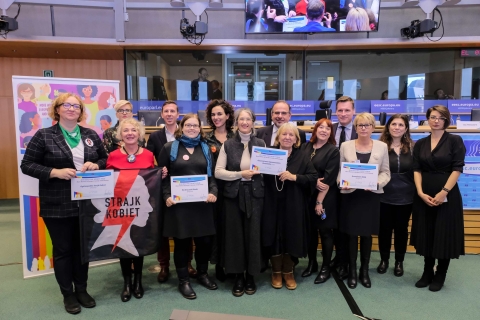European Economic
and Social Committee
Italian organisation "Women's Toponymy" is the winner of the 2019 EESC Civil Society Prize on gender equality
On 12 December, the European Economic and Social Committee (EESC) awarded prizes to five civil society organisations who stand up for equal opportunities for women and men, raise awareness about women's potential and achievements, and contribute to their empowerment in Europe's society and economy.
The prize of EUR 50 000 was shared among five winning projects. The Italian organisation "Women's Toponymy" walked away with the first prize of EUR 14 000. The other four runners-up each received EUR 9 000 and ranked in the following order: the Polish Women's Strike, the Bulgarian Association NAIA with its Fairy Tales project, the Finnish Software and eBusiness Association and its Women Code programme, and The Brussels Binder from Belgium.
"I would like to thank all the candidates – the winners who are here today and everyone who took part – for their impressive and enriching applications. Their projects show that Europe is ready to stand by its commitment to making society truly equal for women and men. Thanks to projects like these, attitudes are slowly changing. The exclusion of women from public life and positions of influence is increasingly viewed as unacceptable and stereotypes about women's roles are considered to be outdated," the EESC President Luca Jahier said at the award ceremony.
The EESC Vice-President for Communication, Isabel Caño Aguilar, said: "I am delighted that this year, the Civil Society Prize is about the empowerment of women. The projects we received fight for this empowerment. They start with young children and with the perceptions that influence us indirectly on a daily basis when we walk down the street or listen to a conference. They fight against horizontal segregation in the labour market in sectors dominated by men, such as IT. They fight against inequality by appealing to us at a subconscious level through the names of our streets, or they do so loudly, by making themselves heard in their home towns."
This year's winner, Women's Toponymy (Associazione Toponomastica femminile) wants to give women public recognition that is often lacking or long overdue, by raising awareness about their contribution to society and history. Believing that toponymy – the study of place names – is a good indicator of the way a society values its members, the organisation is trying to put more notable women on city and town maps.
Its recent research into the names of public places in about 90% of Italian municipalities has shown that for every 100 streets named after men, only 7.8 were named after women, of which some 60% referred to religious figures. There are almost no places featuring the names of notable female scientists, entrepreneurs, artists and sportswomen and Women's Toponymy is set to change that.
The project has had a very positive response, with many municipalities joining in, and now the organisation is already teaming up with associations elsewhere in Europe to spread these good practices.
Accepting the prize, the president of Toponomastica femminile, Maria Pia Ercolini, said: "You need laws to change a society but they are not enough to change behaviour in a lasting way if they are not supported by a parallel change in people's imagination, you need to combat stereotypes and prejudice. This is not just a feminist battle, but a battle for a society based on solidarity and for civilisation."
The second prize went to the Polish Women's Strike, the largest women's movement in Poland, which hit the world's headlines with its Black Monday Strike in 2016. Through protests and marches, the movement demands more rights for women and condemns the government clampdown on basic values and freedoms. It now seeks to empower ordinary women from small and medium-sized Polish cities.
The prize-winning project from Bulgaria, Fairy Tales, came third. This project is run by the NAIA association and uses classical fairy tales to fight against stereotyped gender roles instilled into girls and boys from the earliest age, shaping their minds and limiting their future chances and choices.
In fourth place is Women Code or #mimmitkoodaa, a programme set up by the Finnish Software and e-business Association to disprove the myth that all software developers should be male by default. The programme encourages women to look for opportunities in the software industry and move towards better-paid jobs and careers for the future.
The fifth prize winner is Belgium's The Brussels Binder, a database of female policy experts. It is run by a group of volunteers who advocate better representation of women in European policy debates, which should ensure that EU laws and policies do not fail to reflect women's needs and views. Its aim is to become a go-to resource for improving gender diversity on panels and in the media, in Brussels and throughout the EU.
This year's theme, "More Women in Europe's society and economy", attracted 177 candidates, which is the second highest number of entries in the 11-year history of the prize, just behind the 2016 theme of migration. The entries came from no fewer than 27 Member States, demonstrating the widespread interest of citizens and civil society organisations in taking action to tackle gender inequalities, which still loom large in Europe.
The Civil Society Prize is awarded for "excellence in civil society initiatives". Each year, the prize covers a different aspect of the EESC's work. The theme of the Prize in 2018 was European values, identities and cultural heritage as a way of bringing Europeans together.
Further details about the Civil Society Prize 2019 are available here. You can watch the video detailing the winning projects here.
Media contact:
Laura Lui
EESC press unit
E-mail: press@eesc.europa.eu
Tel: +32 2 546 9189
@EESC_PRESS
